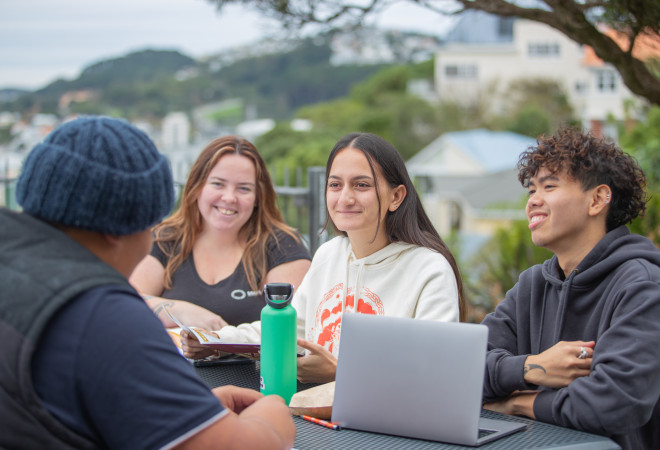
Ako Explored – Six principles for enhancing learner outcomes in tertiary education
Status
Completed: 24 October 2023
Project Details
Ako Explored outlines six universal, evidence-based learning and teaching principles and related practices to enhance positive learner outcomes in the Aotearoa tertiary education sector.
These principles:
- Synthesise national and international literature covering a wide range of factors and influences from seminal writers to contemporary issues and challenges;
- Include evidence-based learning and teaching strategies derived from literature and practice;
- Support education and work-based learning organisations to determine priority practices that enhance learner success and outcomes;
- Guide kaiako (educators) to reflect and continuously improve practice through a series of indicative practices and questions for consideration;
- Can be contextualised in a wide range of learning and teaching settings.
Aims:
- To determine effective learning and teaching principles and practices that positively impact learner outcomes.
- To ensure the principles and practices are accessible and relevant across the tertiary education sector.
Methodology:
- Evidence-based learning and teaching strategies derived from literature and practice.
- Synthesised national and international literature covering a wide range of factors and influences.
- Distilled into key principles, indicative practices, and questions to extend practice.
Team

Linda Keesing-Styles
Educational consultant commissioned by Ako Aotearoa
Key Findings
A synthesis of a wide range of seminal and contemporary evidence-based practice led to the distillation of six principles that make a difference to learner outcomes. These are:
- The foundation of effective ako (learning and teaching) is in knowing ākonga (learners), the strengths they bring, and the challenges they face in learning.
- Knowing and using targeted and relevant practices to achieve successful outcomes with ākonga (learners), will strengthen and improve ako (learning and teaching).
- Ako (learning and teaching) requires positive interpersonal relationships.
- A focus on experience, and the opportunity to reflect on it, complements and strengthens ako (learning and teaching).
- Ako (learning and teaching) is enhanced when there is clear alignment between intended learning outcomes, learning and teaching activities, and assessment.
- Shared high expectations and challenging tasks are motivations for growth and development.
Key Recommendations
Implementation of these principles in context-specific ways will enhance the quality of learner outcomes across the sector.
Project outputs and resources:
- Comprehensive literature synthesis with six principles and associated indicative practices woven into an accessible document available on the project webpage.
- A set of ‘coffee cards’ – one for each principle – that are available to share with teaching teams or for kaiako (educators) to use to challenge and extend their practice.
Download the set of 6 Coffee Table Cards - Videos from two Te Pūkenga subsidiaries discussing approaches to Ako Explored.
View the Ako Explored videos on YouTube
This report outlines principles and practices designed to enhance teaching and leadership in tertiary education, serving as a versatile resource for educators, teams, professional developers, advisors, and tertiary education institutions.
- 24 October 2023
A set of 6 universal, evidence-based learning and teaching principles and related practices to enhance positive learner outcomes in the Aotearoa tertiary education sector.
- 24 October 2023
This card is designed to assist you in unpacking one element of Principle 1 – universal design for learning. It briefly describes the principle and then offers some possible practices that help in making learning accessible and successful for all. It asks some questions to progress thinking about practice and provides some links for further information.
- 24 October 2023
This card is designed to assist you in unpacking some elements of Principle 2 – planning for learner success. It briefly describes the principle and then offers some possible practices that help in enhancing learner success. It asks some questions to progress thinking about practice and provides some links for further information.
- 24 October 2023
This card is designed to assist you in unpacking one element of Principle 3 – inclusive relationships. It briefly describes the principle and then offers some possible practices that help in building an inclusive and supportive learning relationships. It asks some questions to progress thinking about practice and provides some links for further information.
- 24 October 2023
This card is designed to assist you in unpacking one element of Principle 4 – active, experiential learning. It briefly describes the principle and then offers some possible practices that help in putting experience at the centre of learning. It asks some questions to progress thinking about practice and provides some links for further information.
- 20 October 2023
This card is designed to assist you in unpacking one element of Principle 5 – clarity around intended learning outcomes. It briefly describes the principle and then offers some possible practices that help to keep the purpose and outcomes of learning front and centre. It asks some questions to progress thinking about practice and provides some links for further information.
- 24 October 2023
This card is designed to assist you in unpacking one element of Principle 6 – involving learners in goal setting. It briefly describes the principle and then offers some possible practices that help establish motivation for high achievements. It asks some questions to progress thinking about practice and provides some links for further information.
- 24 October 2023
BCITO | Te Pūkenga workplace learning advisors held a workshop to discuss the ways in which their existing practice aligns with Ako Explored principles. They found many synergies which reaffirmed their practice, although their context requires a learning approach quite different to class-based learning and teaching.
- 24 October 2023
BCITO | Te Pūkenga workplace learning advisers consider briefly how the Ako Explored principles relate to their practice.
- 24 October 2023
Unitec | Te Pūkenga Academic Advisors outline some ways in which they would use Ako Explored or encourage others to use the principles, practices, or questions.
- 24 October 2023
Unitec | Te Pūkenga Academic Advisors talk about the roles of knowing, being, and doing as part of the learning process and how this can be considered in how learning is structured.
- 24 October 2023
Unitec | Te Pūkenga Academic Advisors consider the ways in which relationships can be established and nurtured through the effective use of digital technologies.
- 24 October 2023
Dr Marcia Leenen-Young's teaching practice is wrapped around an intimate understanding of Ako (learning and teaching) and the key roles both kaiako (educators) and ākonga (learners) play in the learning and teaching process.
- 24 October 2023
Associate Professor Diane Ruwhiu weaves her teaching practice the learning process around Ako (learning and teaching). She sees this as the core from which the other principles arise.
- 24 October 2023
While Associate Professor Christian Schott notes the criticality of experience as part of the learning process, his starting point is a deep understanding of his ākonga (learners) and their diverse backgrounds and life experiences.
- 24 October 2023
Teaching a demanding topic with a very diverse cohort of students encourages Dr Cami Sawyer to understand her students, what they bring, and the challenges they face. This is the platform on which she builds a connectionist approach to teaching.
- 24 October 2023
In redeveloping courses, David Cox’s strengths are in an intimate understanding of the content and knowing how to adapt his teaching to engage learners and enhance their ability to be successful in the course and beyond.
- 24 October 2023
Associate Professor Kathryn MacCullum utilises a wide range of strategies to engage learners, but at the core of her teaching is the ability to choose the right suite of practices to engage learners and enhance their success.
- 24 October 2023
At the heart of Professor Richard Easter’s practice is the unwavering commitment to connections and collaboration, and the importance of people in the learning process in the face of intellectually challenging content.
- 24 October 2023
Jamie Smiler, who sees himself as a Māori educator, embeds relationships with ākonga (learners) at the heart of his practice.
- 24 October 2023
Professor Carolyn Gates exemplifies the importance of weaving experience meaningfully into teaching and remaining intimately connected to the practice environment.
- 24 October 2023
Using a broad array of inclusive pedagogies, Professor Hazel Tucker addresses very complex issues by maximising the experiences her diverse students bring to learning.
- 24 October 2023
Dr Richard Lobb bases his interactive style of teaching on a keen understanding of how the learning outcomes, learning activities and assessments align to enhance learning and success.
- 24 October 2023
Dr Nick Munn teaches primarily online but does so in a way that is engaging and accessible to learners. He ensures that the teaching and learning activities are creatively connected to the learning outcomes of the course and the subsequent assessments, ensuring relevance and connectedness.
- 24 October 2023
Dr Brendon Dunphy expressly states that he aims to challenge students but does so in a way that supports ākonga (learners) and sustains learning in the long term.
- 24 October 2023
Professor Andy Martin sees challenge and high expectations as a key component of teaching and learning. He encourages his ākonga (learners) to strive to achieve high standards that set them up for academic and career success.
- 24 October 2023